2019托福写作范文:教育孩子的方式
英语作文 教育孩子
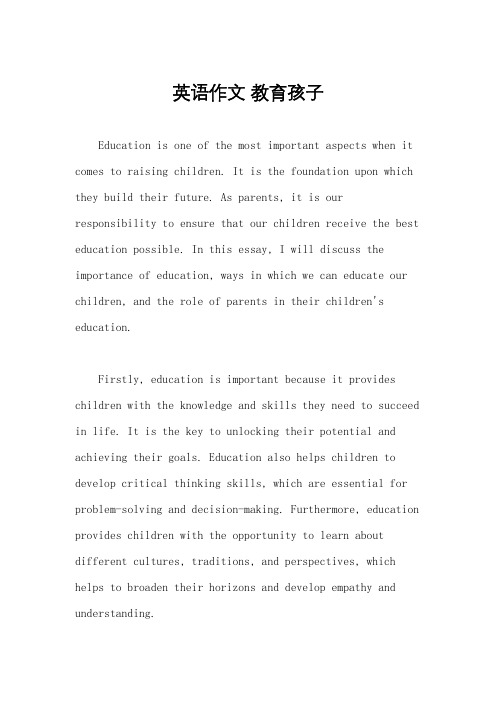
英语作文教育孩子Education is one of the most important aspects when it comes to raising children. It is the foundation upon which they build their future. As parents, it is ourresponsibility to ensure that our children receive the best education possible. In this essay, I will discuss the importance of education, ways in which we can educate our children, and the role of parents in their children's education.Firstly, education is important because it provides children with the knowledge and skills they need to succeed in life. It is the key to unlocking their potential and achieving their goals. Education also helps children to develop critical thinking skills, which are essential for problem-solving and decision-making. Furthermore, education provides children with the opportunity to learn about different cultures, traditions, and perspectives, which helps to broaden their horizons and develop empathy and understanding.There are many ways in which we can educate our children. One of the most important ways is through formal education, which includes attending school and completing a curriculum. However, education does not stop there. Parents can also educate their children through informal means, such as reading to them, engaging in meaningful conversations, and exposing them to different experiences and activities. This helps to foster a love of learning and encourages children to be curious and explore the world around them.The role of parents in their children's education is crucial. Parents are their children's first teachers and play a vital role in shaping their attitudes towards learning. Parents can support their children's education by creating a conducive learning environment at home, providing them with the necessary resources and materials, and encouraging them to take an active interest in their studies. Parents can also work closely with teachers to ensure that their children receive the best possible education.In conclusion, education is essential for the development and success of our children. As parents, we have a responsibility to ensure that our children receive the best education possible. By providing them with a solid foundation of knowledge and skills, we can help them to achieve their goals and reach their full potential. Through formal and informal education, we can instill in our children a love of learning that will last a lifetime.。
教育儿子的方法英语作文
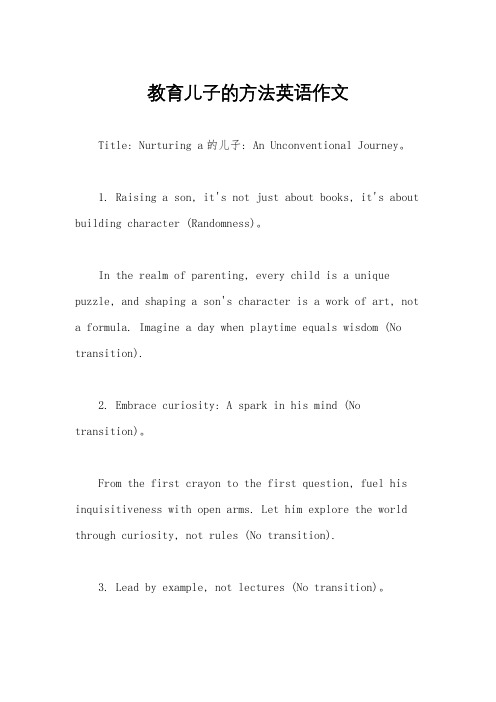
教育儿子的方法英语作文Title: Nurturing a的儿子: An Unconventional Journey。
1. Raising a son, it's not just about books, it's about building character (Randomness)。
In the realm of parenting, every child is a unique puzzle, and shaping a son's character is a work of art, not a formula. Imagine a day when playtime equals wisdom (No transition).2. Embrace curiosity: A spark in his mind (No transition)。
From the first crayon to the first question, fuel his inquisitiveness with open arms. Let him explore the world through curiosity, not rules (No transition).3. Lead by example, not lectures (No transition)。
Teach him to stand tall, not by lecturing him to be brave. Show him resilience through your own actions (No transition).4. Encourage empathy: A heart full of kindness (No transition)。
Teach him to share, not by demanding. Show him the power of understanding through empathy (No transition).5. Freedom to fail: A stepping stone to growth (No transition)。
育儿教育方法英语作文
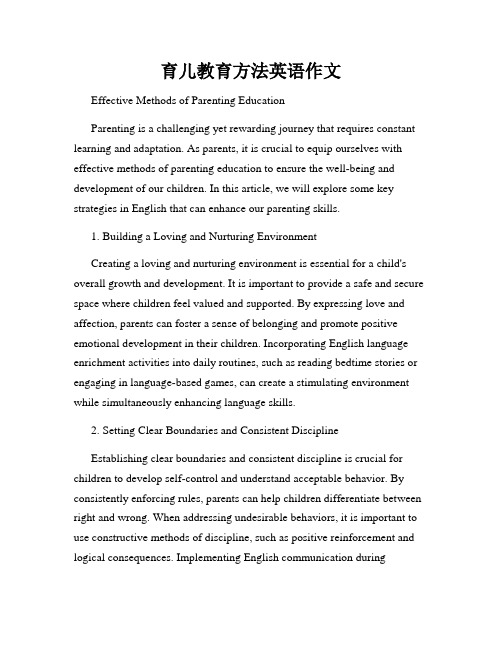
育儿教育方法英语作文Effective Methods of Parenting EducationParenting is a challenging yet rewarding journey that requires constant learning and adaptation. As parents, it is crucial to equip ourselves with effective methods of parenting education to ensure the well-being and development of our children. In this article, we will explore some key strategies in English that can enhance our parenting skills.1. Building a Loving and Nurturing EnvironmentCreating a loving and nurturing environment is essential for a child's overall growth and development. It is important to provide a safe and secure space where children feel valued and supported. By expressing love and affection, parents can foster a sense of belonging and promote positive emotional development in their children. Incorporating English language enrichment activities into daily routines, such as reading bedtime stories or engaging in language-based games, can create a stimulating environment while simultaneously enhancing language skills.2. Setting Clear Boundaries and Consistent DisciplineEstablishing clear boundaries and consistent discipline is crucial for children to develop self-control and understand acceptable behavior. By consistently enforcing rules, parents can help children differentiate between right and wrong. When addressing undesirable behaviors, it is important to use constructive methods of discipline, such as positive reinforcement and logical consequences. Implementing English communication duringdisciplinary discussions can provide children with an opportunity to practice language skills and learn from their mistakes.3. Encouraging Open Communication and Active ListeningOpen communication between parents and children is vital for building strong relationships and fostering healthy emotional development. Parents should create a safe space where children feel comfortable expressing their thoughts, feelings, and concerns. Active listening plays a key role in effective communication. By being attentive and empathetic, parents can understand their child's perspective and respond appropriately in English or any language of preference.4. Emphasizing Positive ReinforcementPositive reinforcement is a powerful tool in shaping a child's behavior and cultivating self-esteem. Acknowledging and rewarding children's efforts and achievements in English language learning can greatly motivate their learning progress. Praise and encouragement for their accomplishments, big or small, helps foster a positive attitude towards language acquisition and boosts their confidence.5. Encouraging Independence and Decision-MakingEncouraging independence and decision-making skills helps children develop confidence, problem-solving abilities, and a sense of responsibility. Giving children opportunities to make choices, within limits, allows them to develop decision-making skills while understanding the consequences of their actions. For instance, involving children in English language learning activities, such as selecting their own books or participating in language-related projects, can empower them to take ownership of their learning journey.6. Being a Role ModelParents, as role models, greatly influence their children's behaviors and attitudes. Demonstrating good communication skills, positive attitudes towards learning, and respect for others in English or any language can inspire children to follow suit. Parents can actively engage in English language learning themselves, showing their child the importance of lifelong learning and setting a positive example.In conclusion, effective parenting education involves creating a loving and nurturing environment, setting clear boundaries, promoting open communication, using positive reinforcement, encouraging independence, and being a role model. By embracing these strategies in our parenting journey, we can foster the holistic growth and development of our children while promoting English language proficiency. Remember, effective parenting is an ongoing process that requires patience, understanding, and continuous learning.。
怎样教育孩子英语作文
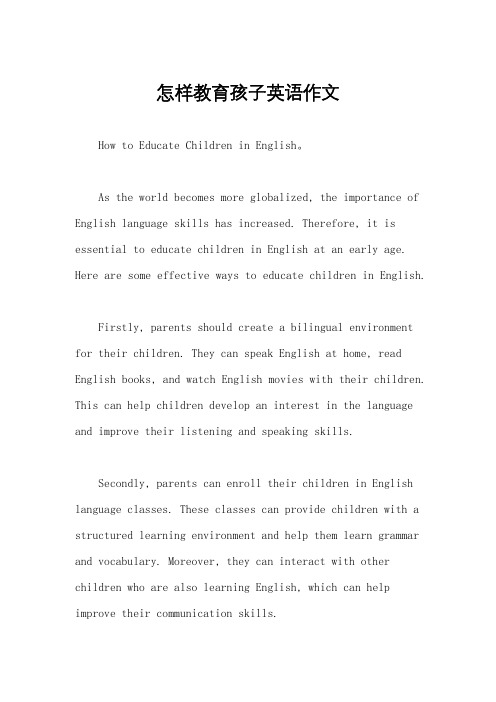
怎样教育孩子英语作文How to Educate Children in English。
As the world becomes more globalized, the importance of English language skills has increased. Therefore, it is essential to educate children in English at an early age. Here are some effective ways to educate children in English.Firstly, parents should create a bilingual environment for their children. They can speak English at home, read English books, and watch English movies with their children. This can help children develop an interest in the language and improve their listening and speaking skills.Secondly, parents can enroll their children in English language classes. These classes can provide children with a structured learning environment and help them learn grammar and vocabulary. Moreover, they can interact with other children who are also learning English, which can help improve their communication skills.Thirdly, parents can use technology to educate their children in English. There are many educational apps and games that can help children learn English in a fun and interactive way. For example, Duolingo is a popular language learning app that children can use to learn English.Fourthly, parents can encourage their children to practice English in their daily lives. For example, they can ask their children to read English books, watch English movies, and listen to English songs. Moreover, they can encourage their children to speak English with them and with their friends.In conclusion, educating children in English is essential in today's globalized world. Parents can create a bilingual environment, enroll their children in English language classes, use technology, and encourage their children to practice English in their daily lives. By doing so, children can develop strong English language skillsthat can benefit them in their future careers and personal lives.。
教育孩子有方法的英文作文
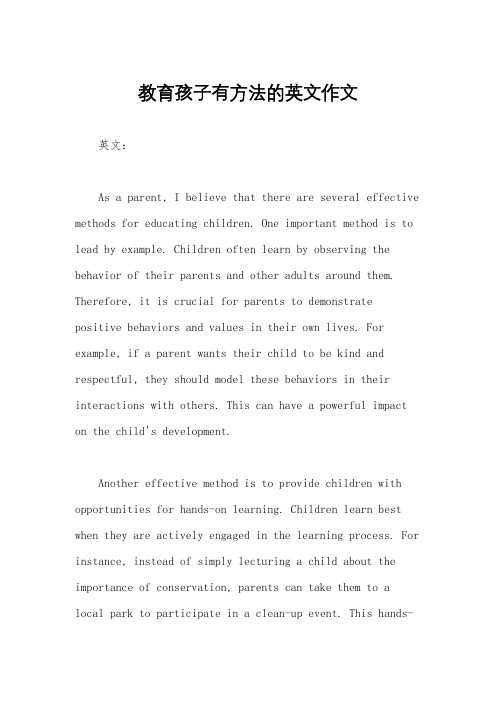
教育孩子有方法的英文作文英文:As a parent, I believe that there are several effective methods for educating children. One important method is to lead by example. Children often learn by observing the behavior of their parents and other adults around them. Therefore, it is crucial for parents to demonstratepositive behaviors and values in their own lives. For example, if a parent wants their child to be kind and respectful, they should model these behaviors in their interactions with others. This can have a powerful impact on the child's development.Another effective method is to provide children with opportunities for hands-on learning. Children learn best when they are actively engaged in the learning process. For instance, instead of simply lecturing a child about the importance of conservation, parents can take them to alocal park to participate in a clean-up event. This hands-on experience allows the child to see the impact of their actions and can make the lesson more meaningful.In addition, I believe that it is important to tailor the educational approach to each child's individual needs and learning style. Some children may thrive in atraditional classroom setting, while others may benefit from alternative forms of education such as homeschooling or Montessori schools. By understanding a child's unique strengths and challenges, parents can better support their learning and development.Ultimately, I think that communication is key to educating children effectively. Parents should strive to maintain open and honest communication with their children, and create an environment where the child feels comfortable expressing their thoughts and asking questions. This can help foster a love of learning and a positive attitude towards education.中文:作为一个家长,我相信教育孩子有几种有效的方法。
如何教育孩子 英文作文
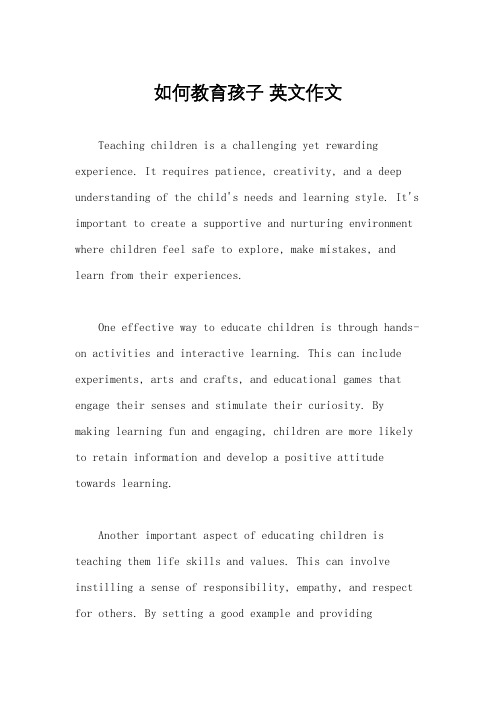
如何教育孩子英文作文Teaching children is a challenging yet rewarding experience. It requires patience, creativity, and a deep understanding of the child's needs and learning style. It's important to create a supportive and nurturing environment where children feel safe to explore, make mistakes, and learn from their experiences.One effective way to educate children is through hands-on activities and interactive learning. This can include experiments, arts and crafts, and educational games that engage their senses and stimulate their curiosity. By making learning fun and engaging, children are more likely to retain information and develop a positive attitude towards learning.Another important aspect of educating children is teaching them life skills and values. This can involve instilling a sense of responsibility, empathy, and respect for others. By setting a good example and providingopportunities for children to practice these skills, they can develop into well-rounded individuals with a strong moral compass.In addition to academic and life skills, it's crucialto encourage children to think critically and independently. This can be achieved through open-ended questions, discussions, and problem-solving activities that challenge their thinking and encourage them to explore different perspectives.Furthermore, it's essential to provide a supportive and inclusive learning environment that celebrates diversityand encourages children to embrace their unique identities. By fostering a sense of belonging and acceptance, children can develop a strong sense of self-worth and respect for others.Overall, educating children is a multifaceted process that requires a combination of creativity, empathy, and a deep understanding of the child's needs. By creating a supportive and inclusive learning environment, teachinglife skills and values, and encouraging critical thinking, children can develop into confident, compassionate, and independent individuals.。
教育方式英文作文
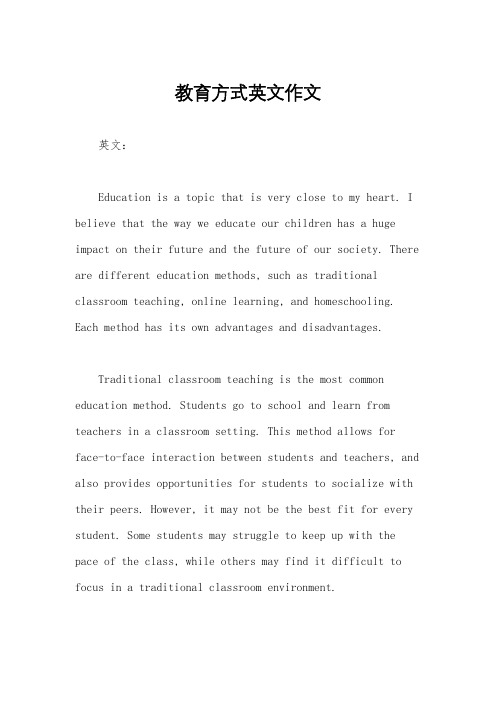
教育方式英文作文英文:Education is a topic that is very close to my heart. I believe that the way we educate our children has a huge impact on their future and the future of our society. There are different education methods, such as traditional classroom teaching, online learning, and homeschooling. Each method has its own advantages and disadvantages.Traditional classroom teaching is the most common education method. Students go to school and learn from teachers in a classroom setting. This method allows for face-to-face interaction between students and teachers, and also provides opportunities for students to socialize with their peers. However, it may not be the best fit for every student. Some students may struggle to keep up with the pace of the class, while others may find it difficult to focus in a traditional classroom environment.Online learning has become increasingly popular in recent years, especially with the advancement of technology. It offers flexibility and convenience, as students canlearn from anywhere with an internet connection. This method is especially beneficial for students who have other commitments, such as work or extracurricular activities. However, online learning requires a high level of self-discipline and motivation, as students need to manage their own time and stay focused without the physical presence ofa teacher.Homeschooling is another education method that has gained attention. It allows parents to tailor thecurriculum to their child's individual needs and interests. Homeschooled students often have more flexibility in their learning schedule and can explore topics in depth. However, homeschooling requires a significant time commitment from parents, and it may limit the social interactions that traditional schooling provides.In my opinion, the best education method is a combination of these approaches. For example, a blendedlearning model that incorporates both traditional classroom teaching and online learning can provide the benefits of both methods. This allows for personalized learning experiences and flexibility, while still maintaining the important social aspect of traditional schooling.中文:教育是我非常关心的一个话题。
如何养育孩子大学英文作文
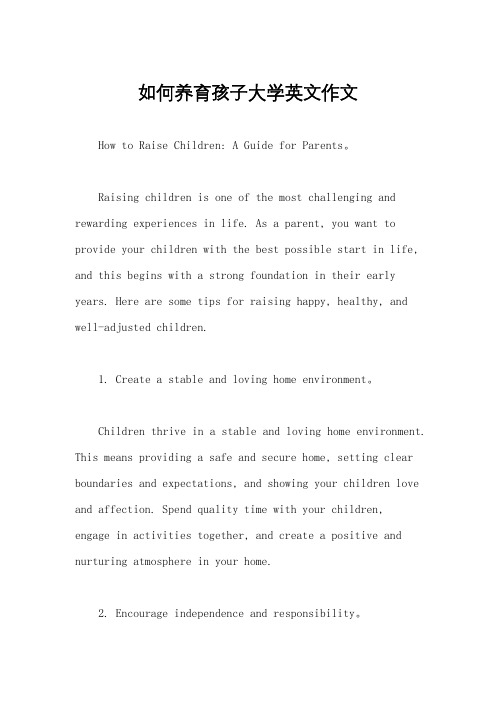
如何养育孩子大学英文作文How to Raise Children: A Guide for Parents。
Raising children is one of the most challenging and rewarding experiences in life. As a parent, you want to provide your children with the best possible start in life, and this begins with a strong foundation in their early years. Here are some tips for raising happy, healthy, and well-adjusted children.1. Create a stable and loving home environment。
Children thrive in a stable and loving home environment. This means providing a safe and secure home, setting clear boundaries and expectations, and showing your children love and affection. Spend quality time with your children, engage in activities together, and create a positive and nurturing atmosphere in your home.2. Encourage independence and responsibility。
As your children grow and develop, it's important to encourage their independence and responsibility. This means giving them opportunities to make choices, take risks, and learn from their mistakes. Teach them the value of responsibility and accountability, and help them develop a strong sense of self-worth and confidence.3. Foster a love of learning。
- 1、下载文档前请自行甄别文档内容的完整性,平台不提供额外的编辑、内容补充、找答案等附加服务。
- 2、"仅部分预览"的文档,不可在线预览部分如存在完整性等问题,可反馈申请退款(可完整预览的文档不适用该条件!)。
- 3、如文档侵犯您的权益,请联系客服反馈,我们会尽快为您处理(人工客服工作时间:9:00-18:30)。
2019托福写作范文:教育孩子的方式
【托福】
2016年托福写作真题题目:
2016年10月16日托福独立写作题目
现在有一些学校require children(5-11岁) to work together instead of working on their own during most of their learning process, do you agree or disagree that is the best way to teach children?
托福写作模板及参考答案:
托福写作范文参考:
2016年10月16日托福独立写作范文
Do you agree or disagree with the following statement? Many schools require young children (aged 5-11) to work together in a small group instead of working alone to learn man activities.
Educators and researchers have never stopped the examination of the importance and relevance of collaborative learning that are encouraged by middle schools. When compared with studying alone, I, personally, believe that it is far more beneficial to students when working in groups for the following reasons.
First off, working in a group can be very conducive for students since they can help students to study more effectively and thus tackle real-world issues. A recent study conducted by University of Minnesota backed up the claim that
study teams, collaborative learning and group projects are
far more effective in helping students to develop useful
skills than traditional teacher-led teaching approach. In fact, when learning in groups, students have to do some research about the topic they are expected to discuss beforehand, which helps them to clear up some misunderstandings and boast their enthusiasm in academic exploration. Clearly, working in a group can help students to retain information for a much longer time and have a much deeper understanding of some concepts and ideas. Consequently, if teachers categorize students and organize them in small study groups, chances are that they would solve complex
issues together, like researching the history of the city, examining the water quality of the local town, so on and so forth. Students can develop critical thinking skills as well
as learn to collect and analyze information from multiple sources.
Additionally, working in groups has much deeper implications beyond students’ academic experience. As the saying goes:“many hands make light work”. Actually it remains as relevant today as it did a century ago. To be more specific, working together helps to develop skills like cooperation, organization and leadership. When learning in a group, every single student gets a chance to contribute their knowledge to the group, and they can learn to appreciate the work of other students simultaneously as well. What’s more, they have to work closely with others for the same goal otherwise they might not be able to compete with other study groups. More importantly, students will get exposure to distinctive perspectives and at the same time learn how to
accept different points of view and find common ground in
this process. Such an educational experience will not only be helpful for their future study but also beneficial to them when they have to deal with coworkers, clients, and teammates in a professional setting in the future. Numerous studies have shown that students who have prior experience working with others enjoy a better chance to be successful in their future career.
In conclusion, working together in a group has far more meaningful implications than working alone since
collaborative learning helps students to learn much more effectively and develop important skills that are vital for their future study and career.。
